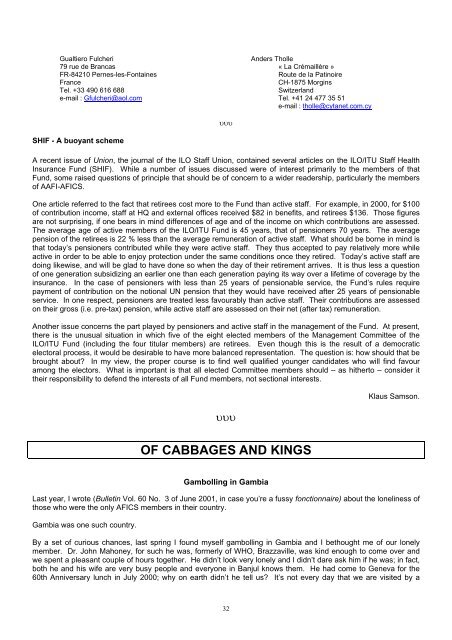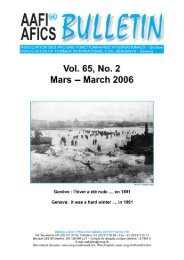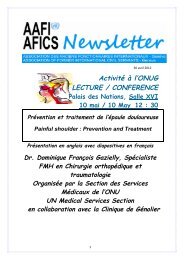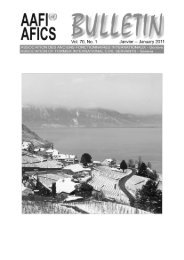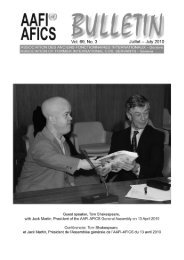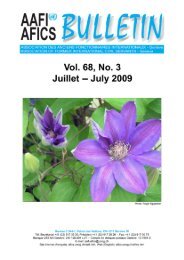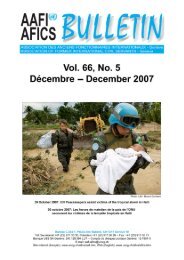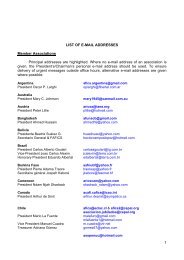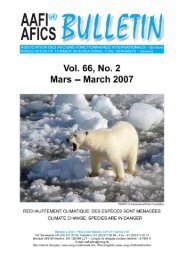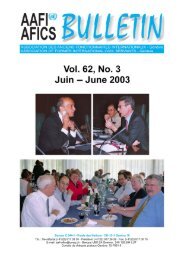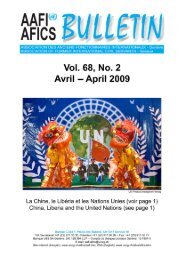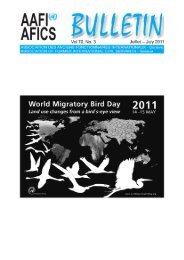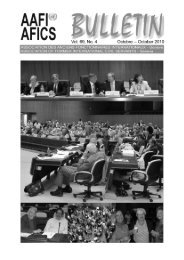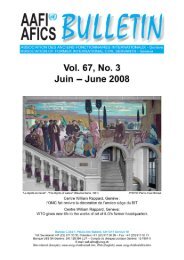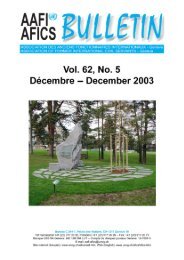You also want an ePaper? Increase the reach of your titles
YUMPU automatically turns print PDFs into web optimized ePapers that Google loves.
Gualtiero FulcheriAnders Tholle79 rue de Brancas « La Crémaillère »FR-84210 Pernes-les-FontainesRoute de la PatinoireFranceCH-1875 MorginsTel. +33 490 616 688Switzerlande-mail : Gfulcheri@aol.com Tel. +41 24 477 35 51e-mail : tholle@cytanet.com.cySHIF - A buoyant schemeA recent issue of Union, the journal of the ILO Staff Union, contained several articles on the ILO/ITU Staff HealthInsurance Fund (SHIF). While a number of issues discussed were of interest primarily to the members of thatFund, some raised questions of principle that should be of concern to a wider readership, particularly the membersof <strong>AAFI</strong>-<strong>AFICS</strong>.One article referred to the fact that retirees cost more to the Fund than active staff. For example, in 2000, for $100of contribution income, staff at HQ and external offices received $82 in benefits, and retirees $136. Those figuresare not surprising, if one bears in mind differences of age and of the income on which contributions are assessed.The average age of active members of the ILO/ITU Fund is 45 years, that of pensioners 70 years. The averagepension of the retirees is 22 % less than the average remuneration of active staff. What should be borne in mind isthat today’s pensioners contributed while they were active staff. They thus accepted to pay relatively more whileactive in order to be able to enjoy protection under the same conditions once they retired. Today’s active staff aredoing likewise, and will be glad to have done so when the day of their retirement arrives. It is thus less a questionof one generation subsidizing an earlier one than each generation paying its way over a lifetime of coverage by theinsurance. In the case of pensioners with less than 25 years of pensionable service, the Fund’s rules requirepayment of contribution on the notional UN pension that they would have received after 25 years of pensionableservice. In one respect, pensioners are treated less favourably than active staff. Their contributions are assessedon their gross (i.e. pre-tax) pension, while active staff are assessed on their net (after tax) remuneration.Another issue concerns the part played by pensioners and active staff in the management of the Fund. At present,there is the unusual situation in which five of the eight elected members of the Management Committee of theILO/ITU Fund (including the four titular members) are retirees. Even though this is the result of a democraticelectoral process, it would be desirable to have more balanced representation. The question is: how should that bebrought about? In my view, the proper course is to find well qualified younger candidates who will find favouramong the electors. What is important is that all elected Committee members should – as hitherto – consider ittheir responsibility to defend the interests of all Fund members, not sectional interests.Klaus Samson.OF CABBAGES AND KINGSGambolling in GambiaLast year, I wrote (Bulletin Vol. 60 No. 3 of June 2001, in case you’re a fussy fonctionnaire) about the loneliness ofthose who were the only <strong>AFICS</strong> members in their country.Gambia was one such country.By a set of curious chances, last spring I found myself gambolling in Gambia and I bethought me of our lonelymember. Dr. John Mahoney, for such he was, formerly of WHO, Brazzaville, was kind enough to come over andwe spent a pleasant couple of hours together. He didn’t look very lonely and I didn’t dare ask him if he was; in fact,both he and his wife are very busy people and everyone in Banjul knows them. He had come to <strong>Geneva</strong> for the60th Anniversary lunch in July 2000; why on earth didn’t he tell us? It’s not every day that we are visited by a32


